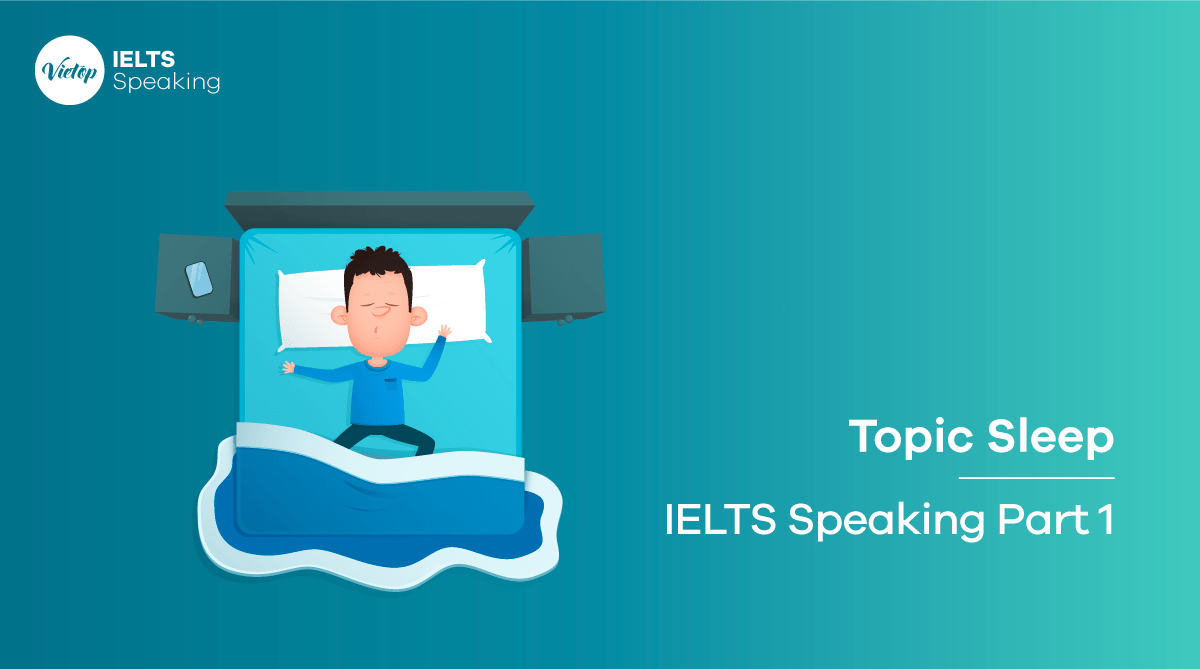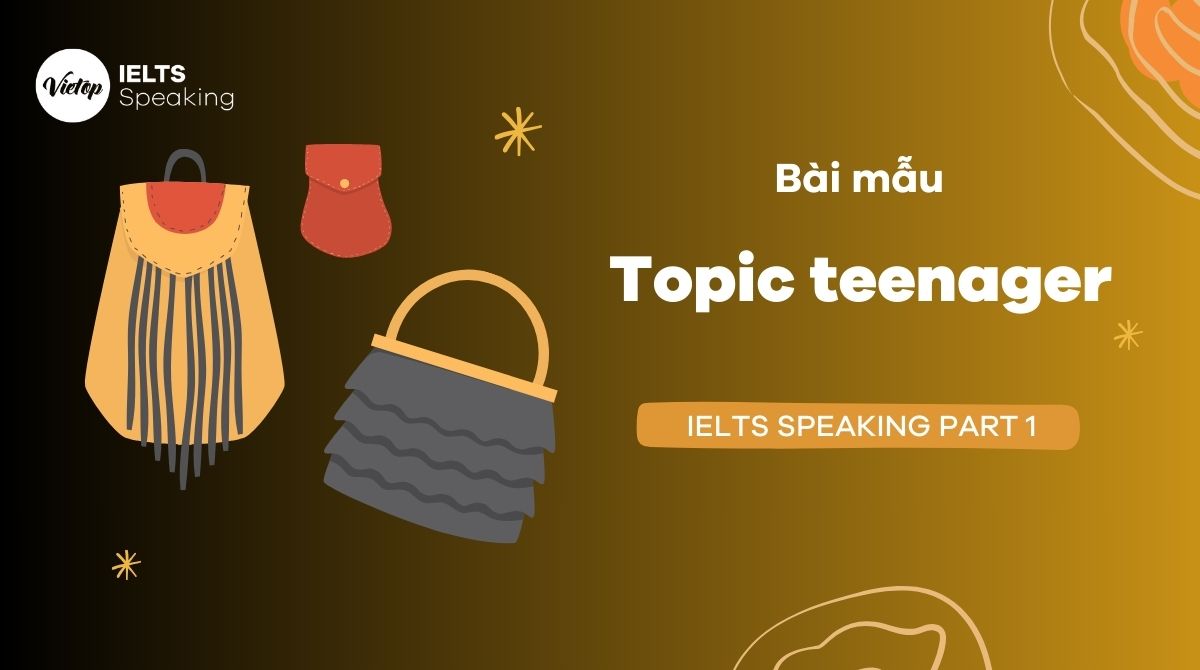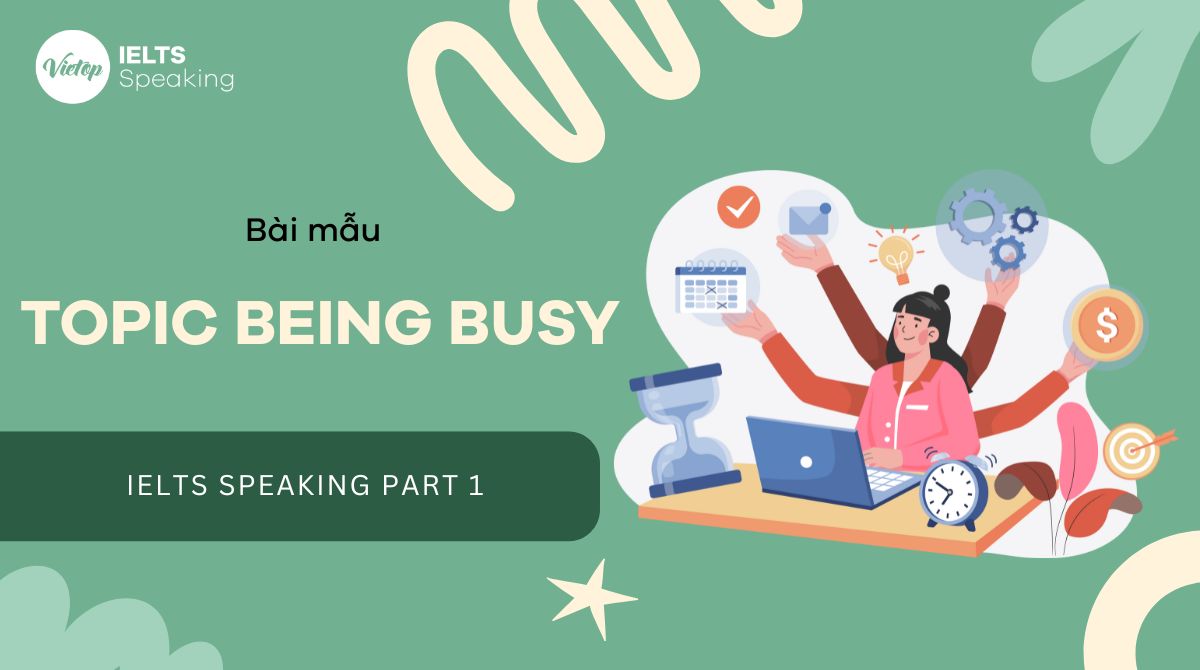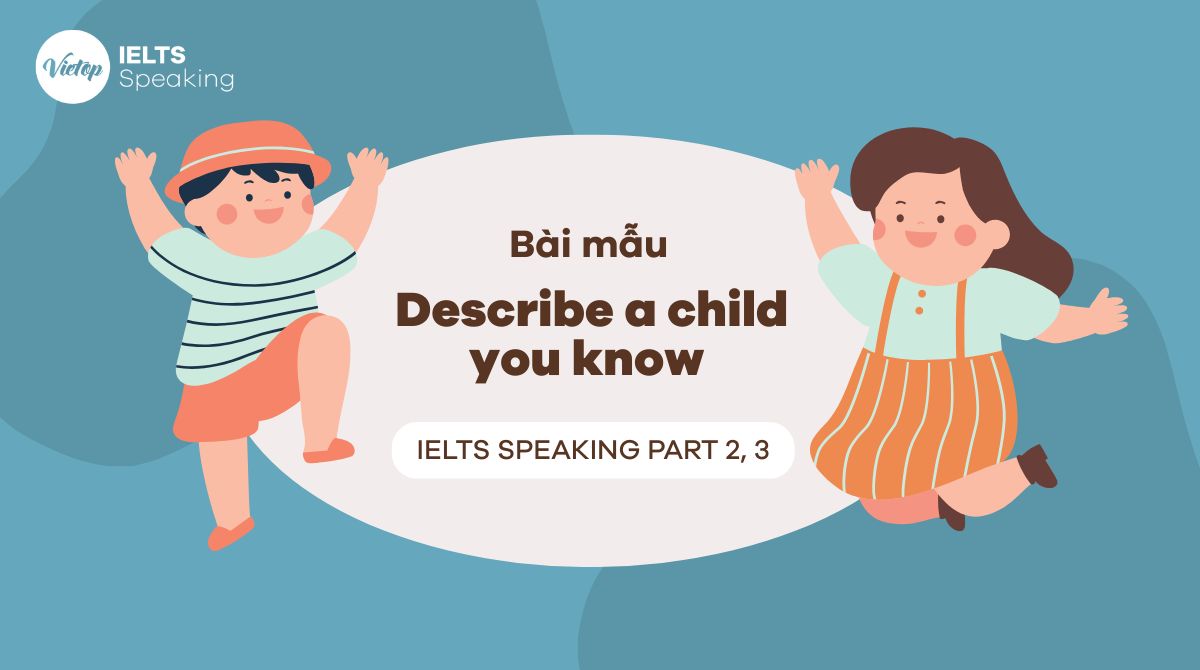Bạn đã biết tổng hợp những câu hỏi IELTS Speaking part 1 phổ biến nhất trong Topic Sleep? Nếu chưa thì hãy cùng Vietop đọc xem những câu hỏi ấy là gì và tham khảo mẫu câu trả lời hay nhé!
1. Từ vựng ăn điểm chủ đề Sleep

- Nap: a short sleep, especially during the day: ngủ trưa
- Snooze: sleep lightly for a short time, especially somewhere other than in your bed: chợp mắt.
- Nod off (v): ngủ gà gật
- Hard habit to break: thói quen xấu khó bỏ. Example: I used to nod off in class because of staying up late at night watching tv shows or dramas. I know it’s bad for my health but it is a hard habit to break.
- Drift off to sleep: thiu thiu ngủ, trôi dần vào giấc ngủ
- Deep sleep: ngủ sâu/say
- Struggle to get to sleep: khó ngủ
- Sleeping pill: a kind of medication to get to sleep: thuốc ngủ. Example: Recently, I struggle to get to sleep. It takes me nearly an hour to finally fall asleep. That’s why I have to take sleeping pills.
- Night owl: cú đêm, người hay thức khuya
- Early bird: người có thói quen dậy sớm vào buổi sáng
- Morning person: người hoạt động tích cực/ nhiều năng lượng vào buổi sáng.
- Night person: người hoạt động tích cực/ nhiều năng lượng vào buổi tối
- Beauty rest/sleep: going to sleep early to get a fair skin: giấc ngủ sớm để có làn da đẹp/cải thiện sắc đẹp.
- Recharge (energy): sạc lại năng lượng
- Burn the midnight oil: study or work late into the night: thức khuya để học/làm việc
- Nerve-racking (adj) = stressful
- Feel full of energy: cảm thấy tràn đầy năng lượng
- Sleep habits: thói quen về việc ngủ
- Lethargic (a): having little energy: uể oải Example: In the mornings, I often feel lethargic. I don’t fully wake up until I’ve had a cup of coffee and moved around for a bit.
- A sound sleep: một giấc ngủ ngon
- Insomnia (n): chứng mất ngủ
- Light sleeper: người khó ngủ/dễ bị đánh thức khi ngủ.
- Middle of the night: nửa đêm Example: I’m a light sleeper, so just only a little noise can wake me up in the middle of the night. And then I have to manage to get back to sleep frustratingly.
- Circadian rhythm: nhịp sinh học
- Blood circulation: sự tuần hoàn máu.
- Brace (v): chống trụ
Học IELTS hiệu quả với giáo viên giàu kinh nghiệm. Tham gia ngay khóa luyện thi IELTS 4.0 cùng Vietop English
2. Bài mẫu Topic Sleep – IELTS Speaking Part 1

Mời bạn cùng nghe Podcast bài mẫu Part 1 của Vietop English nhé:
2.1. What time do you go to bed?
Actually, it depends. If I have nothing much to do, I’ll hit the sheet at around 10.30 or 11 o’clock to have a beauty sleep. But unfortunately, there are many times I have to burn the midnight oil to finish my work on time, so I tend to go to bed really late, at around 1 or 2 am.
- Hit the sheet: đánh vào tờ giấy
- A beauty sleep: một giấc ngủ đẹp
- The midnight: nửa đêm
2.2. Do you have a nap during the day?
Yes, I do. I always try to take a nap to brace for the tasks in the afternoon. Only 30 minutes for a nap can really recharge my energy. And to be honest, I think everyone should do that; it’s really good for health.
- Take a nap: đánh một giấc
- Brace: cú đúp
- Recharge: nạp điện
- Energy: năng lượng
2.3. Do you think sleep is important?
Yes, absolutely. Sleep plays an important role in the function of the brain. An adequate sleep helps to improve memory and learning, increase attention and creativity, and aid in making decisions.
Khóa học IELTS tại Vietop English không chỉ là nơi để học tiếng Anh mà còn là nơi để bạn khám phá những điều mới lạ và trải nghiệm những hoạt động hấp dẫn. Đăng ký ngay để cải thiện kỹ năng Speaking của mình nhé!
2.4. Do you like to get up early in the morning?
Yes. Actually, I’m an early bird, you know. I always enjoy the sun pouring through my window and the fresh air. Getting up early to do physical exercises and have a breakfast at home make me feel full of energy.
- An early bird: một con chim sớm
- Feel full of energy: cảm thấy tràn đầy năng lượng
2.5. How to have a good sleep?
I guess people have different ways to get a sound sleep. But if you ask me, I would say firstly, thriller or horror movies need to be avoided. They somehow make you feel a sound sleep instead of relaxed. Also, it is advisable that a good sleep lasts for 7-8 hours so staying up late is not preferable. And lastly, instead snacking or having a big meal before going to bed, a cup of chamomile tea is utterly a better option.
- A sound sleep: một giấc ngủ ngon
2.6. What things can make you fall asleep?
Several factors can help me fall asleep more easily. Firstly, maintaining a comfortable sleep environment is crucial. A cool, dark, and quiet room is ideal for me. Secondly, I find that engaging in relaxing activities before bedtime, such as reading a book or practicing deep breathing exercises, can calm my mind and prepare me for sleep.
Avoiding caffeine and heavy meals in the evening is another essential aspect, as it helps prevent sleep disruptions. Lastly, adhering to a consistent sleep schedule and not using electronic devices right before bed can also contribute to better sleep quality.
- Disruptions: sự gián đoạn
2.7. Does anything make it difficult for you to fall asleep?
Yes, a few factors can make it challenging for me to fall asleep. Stress and anxiety are major contributors. When I have a lot on my mind or am feeling worried about something, it can keep me awake. Additionally, exposure to screens, like phones or computers, right before bedtime can disrupt my sleep due to the blue light they emit.
Consumption of caffeinated beverages, especially in the evening, is another factor that interferes with my ability to fall asleep. Finally, discomfort, such as an uncomfortable mattress or a noisy environment, can also make it difficult for me to drift off to sleep.
2.8. Is it necessary to take a nap every day?
No, it’s not necessary to take a nap every day. Whether or not one needs a daily nap depends on individual preferences and lifestyle. Some people find that a short nap during the day can boost their energy and productivity. However, others can function perfectly well without daily naps. It’s more about personal choice and what makes you feel the most rested and alert.
2.9. Do you prefer to go to bed early or late?
I prefer to go to bed early. I find that getting a good night’s sleep is essential for my overall well-being and productivity. Going to bed early allows me to wake up feeling refreshed and ready to tackle the day. It also aligns with my natural circadian rhythm, so I tend to be more alert and focused in the morning.
2.10. How many hours do you sleep every day?
I typically aim for around 7 to 8 hours of sleep every day. I find that this duration of sleep allows me to feel well-rested and alert throughout the day. However, the amount of sleep one needs can vary from person to person, and it can also depend on various factors like age, lifestyle, and overall health.
2.11. Do old people sleep a lot? Why?
Yes, older people tend to sleep less on average compared to younger individuals. There are several reasons for this.
Firstly, as people age, their sleep patterns often change. They may experience more fragmented sleep, waking up during the night, which can reduce the total sleep duration. Additionally, older adults may experience more frequent awakenings due to medical conditions, discomfort, or the need to use the bathroom.
Secondly, older individuals often have fewer daily activities and may not require as much sleep as younger, more active people.
Lastly, the circadian rhythm, which regulates sleep, can shift with age, leading to earlier bedtimes and earlier wake-up times, which can result in shorter nighttime sleep.
While older people may sleep less at night, many compensate with daytime naps, leading to a similar overall amount of sleep, but distributed differently than in their younger years.
- Fragmented sleep: giấc ngủ rời rạc
- Discomfort: khó chịu
2.12. Can you sleep well if you are in a noisy environment?
No, I find it quite challenging to sleep well in a noisy environment. Excessive noise can be very disruptive to my sleep, making it difficult to fall asleep or stay asleep. I prefer a quiet and peaceful setting when it’s time to rest, as it helps me relax and ensures a better quality of sleep.
2.13. How many hours do you sleep at night?
On an average night, I aim for about 7 to 8 hours of sleep. I find that this amount of sleep allows me to wake up feeling refreshed and ready to face the day. However, the ideal amount of sleep can vary from person to person, and it can depend on factors like age, lifestyle, and individual needs.
Chúc các bạn ôn thi IELTS tốt và hãy bắt dầu bài Speaking của mình về Topic Sleep ngay nhé! Và đừng quên luyện tập thêm top chủ đề IELTS Speaking Part 1 thông dụng nhất để nâng band điểm trong phần thi IELTS nhé.
Bạn có thể xem thêm các bài mẫu khác tại chuyên mục IELTS Speaking part 2, IELTS Speaking part 3 của Vietop nhé.









